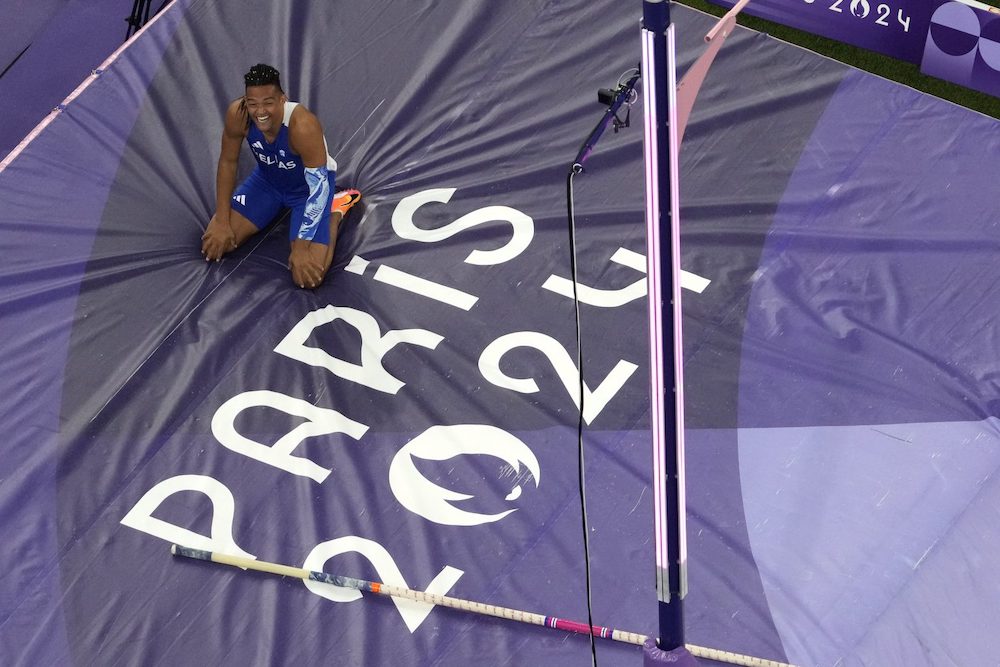The greek tv presenters were ecstatic, pointing out that the only other athlete with back-to-back victories in the long jump, is King Carl (in fact he won four in a row, but who is counting). I must say that this victory of Miltos was less exciting than the one in Tokyo. Here he was everybody's favourite. He has been dominating completely long jump, his last defeat in a major competition going back to 2022. He was coming from a victory in Rome, at the Europeans, where he had jumped (twice) 8.65 m.
To tell the truth I was expecting a jump at around 8.70 m (which is perfectly within the capability of Tentoglou). So, at the end of the day, I felt as if something was missing. The competition was uneventful. M. Furlani opened with 8.34 m and tentoglou responded, first with a cautious 8.27 m and then with 8.48 m, which was enough for gold. W. Pinnock also passed Furlani with his second jump at 8.36 m but could do no better than this (he had a 8.24 m at his fifth jump). Furlani landed another 8.34 at his fifth attempt and that was that. Meanwhile Tentoglou had a series of 8.24, 8.36 and 8.31 for his 3rd, 4th and 5th jumps and, having secured the victory, fouled the last jump. S. Ehammer, who had decided not to compete in the decathlon opting for the long jump, finished fourth with 8.20 m.
I find the comparison of Tentoglou to King Carl quite legitimate. Since he first made his appearance at the international scene, winning the 2017 European U20 championships with 8.07 m has has been a dominant figure of the discipline. The only thing that is missing are the great performances (starting with the greek national record). But, at 26, Miltos still has time for this.
And Karalis is bronze medalist
I still remember the frustration of the Tokyo Olympics where T. Braz had a lucky success at 5.87 m and pushed Karalis out of the medals. So, in Paris I was wondering whether "Manolo" was going to go the Roubanis or the Papanicolaou way.
In Melbourne, at the 1956 Olympics the three americans where the favourite for the podium. But then G. Mattos failed at 4.40 m, and G. Roubanis succeeded and went no to jump 4.50 m, clinching bronze behind B. Richards and B. Gutowski. It's funny that none of four renowned athletics statisticians, R. Quercetani among them, predicted Roubanis among the first six. What is less funny is that much later Mattos insinuated that Roubanis had an advantage jumping with a fibreglass pole. (Roubanis had indeed experimented with fibreglass poles but does not remember using them in the Melbourne Olympics. And in any case, these poles did not offer a real advantage till the 1961 where the athletes started bending the poles).
Ch. Papanicolaou went to Mexico as one the the favourites(he was silver medalist at the 1966 Europeans). He jumped 5.35 m on his first attempt just as Nordwig (Seagren going directly to 5.40 m) and was thus 2nd or 3rd. Then an unknown till then vaulter, C. Schiprowski, succeeded on his second try. The disaster came at 5.40 m. Seagren, Schiprowski and Nordwig succeeded while Papanicolaou failed, and was thus pushed out of the podium. (Papanicolaou took a small vengeance two years later when he broke the world record with 5.49 m, a outstanding height for those who, insist in using the antiquated imperial measures, since it corresponds to precisely 18 feet).
In Paris, Karalis, showed a great consistency in his jumps, passing all heights from 5.50 to 5.90 m in his first attempt. Only Obiena and Kendricks had reached that height (but, of course, with Duplantis in the game there only two spots on the podium left). Kendricks jumped 5.95 m and after one failed attempt Karalis opted to continue at 6 m. Obiena (who had a 6 m personal best and has jumped 5.97 m this season) failed three times at 5.95 m and Karalis was on the podium.
Those who are closely following my blog may point out that I never did a "stop the presses" article for K. Stefanidi (Olympic, World and European champion, who started as world U18 champion in 2005). I know that it will sound as a lame excuse, but I got the idea of the "stop the presses" thing only in 2021, when Miltos won the Tokyo Olympics. So, if ever Katerina reads these lines, I present my humble apologies to this great champion who, at 34, is still among the best pole vaulters of the world.




No comments:
Post a Comment